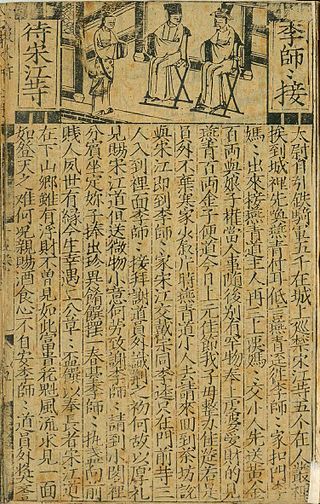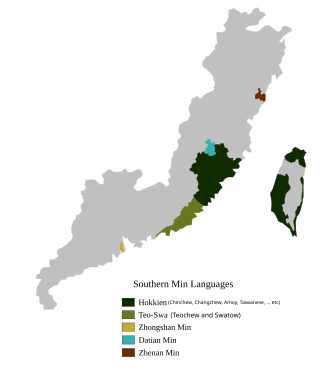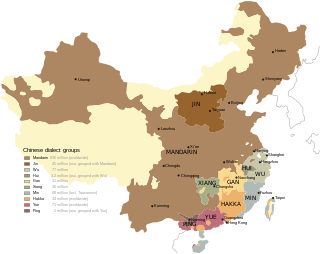
Mandarin is a group of Chinese language dialects that are natively spoken across most of northern and southwestern China and Taiwan. The group includes the Beijing dialect, the basis of the phonology of Standard Chinese, the official language of China and Taiwan. Because Mandarin originated in North China and most Mandarin dialects are found in the north, the group is sometimes referred to as Northern Chinese. Many varieties of Mandarin, such as those of the Southwest and the Lower Yangtze, are not mutually intelligible with the standard language. Nevertheless, Mandarin as a group is often placed first in lists of languages by number of native speakers.

Standard Chinese is a modern standard form of Mandarin Chinese that was first codified during the republican era (1912–1949). It is designated as the official language of mainland China and a major language in the United Nations, Singapore, and Taiwan. It is largely based on the Beijing dialect. Standard Chinese is a pluricentric language with local standards in mainland China, Taiwan and Singapore that mainly differ in their lexicon. Hong Kong written Chinese, used for formal written communication in Hong Kong and Macau, is a form of Standard Chinese that is read aloud with the Cantonese reading of characters.

Manchukuo was a puppet state of the Empire of Japan in Northeast China that existed from 1932 until its dissolution in 1945. It was ostensibly founded as a republic, its territory consisting of the lands seized in the Japanese invasion of Manchuria; it was later declared to be a constitutional monarchy in 1934, though very little changed in the actual functioning of government. Manchukuo received limited diplomatic recognition, mostly from states aligned with the Axis powers, with its existence widely seen as illegitimate.

Chinglish is slang for spoken or written English language that is either influenced by a Chinese language, or is poorly translated. In Hong Kong, Macau, Guangdong and Guangxi, the term "Chinglish" refers mainly to Cantonese-influenced English. This term is commonly applied to ungrammatical or nonsensical English in Chinese contexts, and may have pejorative or deprecating connotations. Other terms used to describe the phenomenon include "Chinese English", "China English", "Engrish" and "Sinicized English". The degree to which a Chinese variety of English exists or can be considered legitimate is still up for debate.

Water Margin, also called Outlaws of the Marsh or All Men Are Brothers, is a Chinese novel from the Ming dynasty that is one of the preeminent Classic Chinese Novels. Attributed to Shi Nai'an, Water Margin was one of the earliest Chinese novels written in vernacular Mandarin Chinese.

The grammar of Standard Chinese shares many features with other varieties of Chinese. The language almost entirely lacks inflection; words typically have only one grammatical form. Categories such as number and verb tense are often not expressed by grammatical means, but there are several particles that serve to express verbal aspect and, to some extent, mood.

Jacky Cheung Hok-yau is a Hong Kong singer and actor. Cheung is widely regarded as a Heavenly King of Cantopop music and an icon of Hong Kong popular culture. He is often dubbed as the "God of Songs" for his vocal delivery and live performances.

Wu is a major group of Sinitic languages spoken primarily in Shanghai, Zhejiang province, and parts of Jiangsu province, especially south of the Yangtze River, which makes up the cultural region of Wu. The Wu languages are at times simply called Shanghainese, especially when introduced to foreigners. The Suzhounese variety was the prestige dialect of Wu as of the 19th century, but had been replaced in status by Shanghainese by the turn of the 20th century, coinciding with a period of rapid language change in the city. The languages of Northern Wu constitute a language family and are mutually intelligible with each other, while those of Southern Wu neither form a phylogenetic language family, nor are mutually intelligible with each other.
The Shanghainese language, also known as the Shanghai dialect, or Hu language, is a variety of Wu Chinese spoken in the central districts of the city of Shanghai and its surrounding areas. It is classified as part of the Sino-Tibetan language family. Shanghainese, like the rest of the Wu language group, is mutually unintelligible with other varieties of Chinese, such as Mandarin.

Teochew, also known as Teo-Swa, is a Southern Min language spoken by the Teochew people in the Chaoshan region of eastern Guangdong and by their diaspora around the world. It is sometimes referred to as Chiuchow, its Cantonese rendering, due to English romanization by colonial officials and explorers. It is closely related to Hokkien, as it shares some cognates and phonology with Hokkien.
The kyōiku kanji, sometimes called the gakushū kanji, are those kanji listed on the Gakunenbetsu kanji haitō hyō, a list of 1,026 kanji and associated readings developed and maintained by the Japanese Ministry of Education that prescribes which kanji, and which readings of kanji, Japanese students should learn from first grade to the sixth grade of elementary school. Although the list is designed for Japanese students, it can also be used as a sequence of learning characters by non-native speakers as a means of focusing on the most commonly used kanji.

The Sinitic languages, often synonymous with the Chinese languages, are a group of East Asian analytic languages that constitute a major branch of the Sino-Tibetan language family. It is frequently proposed that there is a primary split between the Sinitic languages and the rest of the family. This view is rejected by some researchers but has found phylogenetic support among others. The Macro-Bai languages, whose classification is difficult, may be an offshoot of Old Chinese and thus Sinitic; otherwise, Sinitic is defined only by the many varieties of Chinese unified by a shared historical background, and usage of the term "Sinitic" may reflect the linguistic view that Chinese constitutes a family of distinct languages, rather than variants of a single language.
Mars is a Taiwanese drama starring Barbie Shu and Vic Chou of F4 who reunited since Meteor Garden and its sequel Meteor Garden II. It is based on the Japanese shōjo manga series, Mars written by Fuyumi Soryo. It was produced by Comic Ritz International Production and Chai Zhi Ping as producer and directed by Cai Yuexun.

Taiwanese Mandarin, frequently referred to as Guoyu or Huayu, is the variety of Mandarin Chinese spoken in Taiwan. A large majority of the Taiwanese population is fluent in Mandarin, though many also speak a variety of Min Chinese known as Taiwanese Hokkien, which has had a significant influence on the Mandarin spoken on the island.

Profanity in Mandarin Chinese most commonly involves sexual references and scorn of the object's ancestors, especially their mother. Other Mandarin insults accuse people of not being human. Compared to English, scatological and blasphemous references are less often used. In this article, unless otherwise noted, the traditional character will follow its simplified form if it is different.

Cass Phang is a retired Cantopop singer from Hong Kong, affiliated with EMI from 1993 to 1998 and then with Sony Music Entertainment. She was born in Hong Kong, studied at Munsang College and a high school in Australia. In September 1998, she married Hong Kong actor and pop singer Jan Lamb, a member of musical rap duo DJ Softhard. She gave birth to two daughters on 14 February 2000 and 28 July 2004.

Hokkien is a variety of the Southern Min languages, native to and originating from the Minnan region, in the southeastern part of Fujian in southeastern mainland China. It is also referred to as Quanzhang, from the first characters of the urban centers of Quanzhou and Zhangzhou.

The Flower Girl is a North Korean revolutionary genre theatrical performance, which was written by the country's leader Kim Il Sung. The performance is considered one of the "Five Great Revolutionary Operas", a group of classical, revolution-themed opera repertoires well received within North Korea. It was also made into a novel. A film adaption of the opera starring Hong Yong Hee was made in 1972.
Malaysian Cantonese is a local variety of Cantonese spoken in Malaysia. It is the lingua franca among Chinese throughout much of the central portion of Peninsular Malaysia, being spoken in the capital Kuala Lumpur, Perak, Pahang, Selangor, Putrajaya and Negeri Sembilan, it is also widely understood to varying degrees by many Chinese people throughout the country, regardless of their ancestral language.

Someday or One Day is a Taiwanese TV drama released in 2019 directed by Huang Tien-jen (黃天仁), and stars Alice Ko, Greg Han, Patrick Shih and Kenny Yen. It was produced by Fox Networks Group Asia Pacific, Hualien Media International, and Three Phoenixes Production Co. Ltd. (三鳳製作), and received NT$22 million in subsidy from the Bureau of Audiovisual and Music Industry Development.














